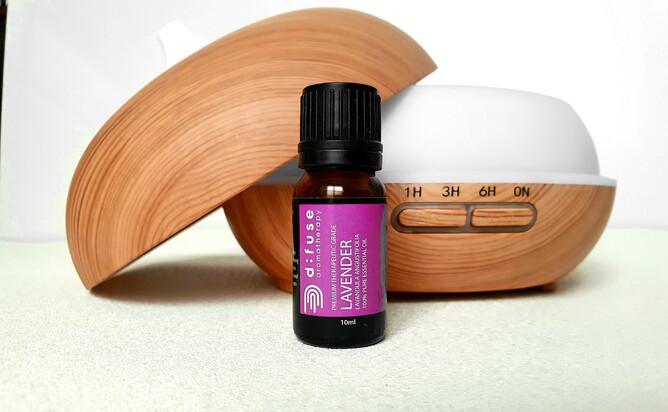Lavender!
Essential oils have been around for centuries, and arguably the most popular and commonly used of all time would have to be lavender. The word ‘lavender’ is believed to be derived from the Latin word “lavere” which means “to wash”. In the historic days, it was believed that the Romans had used it as a perfume and in baths. Nowadays, you will find lavender-scented products ubiquitously in stores, for example in pillows, hand creams, gels, soaps and the list goes on. The lavender essential oil comes primarily from the flowers of the lavender plant via steam distillation. It can be sourced from different countries around the world; even though the plant can be of the same species, they can sometimes have slightly different scents depending on the origin.
Surprisingly, its oil is not as strong on the skin as other essential oils - though we would still recommend it to be diluted before use (if applied onto skin). Lavender’s popularity is attributed not only to its lovely fresh and calming floral scent, but it’s also because it has many therapeutic purposes which can benefit the body in many ways. In this blog, we will explore eight ways you can incorporate the lavender essential oil in your life and how it can benefit you.
In no particular order, here are 8 benefits of the lavender essential oil:
1. Reducing anxiety, stress and depression.
If you often find yourself stressed out, the lavender essential oil may be a suitable solution for you. Lavender is well-known for its calming and relaxing effects which can help with tension and stress relief. There have been many studies which show the positive calming effects of lavender, including some which have shown the positive effects of lavender on depression.
A pilot study was done in 2012 which focused on the effects of clinical aromatherapy on postpartum depression. The results indicated that aromatherapy use of lavender oil helped and improved their anxiety and depression scale scores.
Study located here.
2. Improve sleep quality
I’m sure many of you may have come across lavender pillows at your local homeware store. Diffusing and topical application of lavender essential oils can provide the same benefits in terms of sleep. Using lavender oil before bed, whether it’s a bath or just in an aromatherapy diffuser, may help provide you with a good night’s rest naturally.
One new research study done by a psychologist at Wesleyan University got 31 men and women to sniff lavender essential oils for two consecutive nights. One night with lavender oil and water the next (for four 2-minute periods) to help determine the effects of the lavender essential oil. With brain scans, the researchers were able to monitor their sleep; they found that their percentage of deep sleep increased with lavender. The men and women also felt that their energy levels were higher the next morning following the lavender exposure. This could be due to the increase in deeper sleep, or the presence of lavender; either way I’m sure they’re not complaining!
Have a read of the study here!
3. Helps with the treatment of eczema.
Eczema is a skin condition that affects many people, and lavender oil can be very handy when it comes to this. Essential oils can help eczema by relieving the itchy areas of the skin and hydrate it at the same time. As lavender is quite gentle compared to other oils, it makes it great for certain skin conditions. Simply mix a few drops of Lavender and Tea tree essential oils together with a carrier oil and apply topically to affected areas. 1:5 ratio of essential oil to carrier oil usually does the trick. Remember to always use essential oils with caution (initial patch test ideal), and discontinue use if you have any irritation to essential oils.
4. Lavender essential oil for your respiratory system.
Any changes to the respiratory system can disturb the body’s function. Lavender has natural antibacterial and anti-inflammatory properties, and because of this it helps in treatment of a wide range of respiratory conditions. These include the flu, cough and colds, sinus congestion and so on. Have excess phlegm? Try applying lavender oil topically with a carrier oil or diffused for a calming and soothing relief. If you have more serious respiratory conditions or are after something a bit stronger to clear the airways, use a blend of eucalyptus and peppermint essential oils in your aromatherapy diffuser.
5. Wound healing
Bothered by a small cut, wound or even a burn? If so, the lavender essential oil may help. Lavender has analgesic and anti-inflammatory properties to help reduce the pain from cuts and wounds. It also has the antibacterial properties to accelerate the wound healing process. Just remember to use it with a carrier oil when using topically!
A study done in 2016 tested the wound healing potential of lavender oil on lab rats. The study found that lavender oil allowed wounds to heal up quicker compared to the control group. This occurred due to the oil accelerating the formation of granulation tissue and promoting collagen synthesis.
Study located here.
6. Natural Insect Repellent: Keep the mosquitoes away!
Insects, mosquitoes especially, can appear in many places during the warmer months and they can sure bite! If you’re like us, we try to avoid these little creatures as much as possible. Lavender is a natural way to keep the mozzies away and it doesn’t smell bad either. Its potent smell is what the insects don’t like, which repels the insects. If you have already been bitten, the antibacterial properties of lavender is an added bonus. Using lavender oil topically with a carrier oil can help soothe the itch.
A natural insect repellent recipe that we like to use when we are out and about is 25-30 drops of Lavender essential oil (or our insect repellent blend) blended with 50mls of water in a small spray bottle. If you find that your skin is sensitive or may be having a bad reaction to essential oils, try reducing the amount of oil or discontinue use.
7. Helps to promote hair growth:
There has been growing evidence to suggest that lavender does indeed promote the growth of stronger and thicker hair. Hair loss is unfortunately something that can be embarrassing, frustrating and scary. A study done on lab mice found that topical application of the lavender essential oil had a promotive effect on hair growth.
Study can be read here.
8. Your home:
The lavender essential oil is a versatile oil for many different purposes around the house. It is a great natural replacement to commercial cleaning agents. With antibacterial and anti-fungal properties, this makes it perfect for your home. A vinegar and water solution with drops of lavender essential oil is a great natural solution for cleaning kitchens, bathrooms and dining areas.
Please note when using any essential oils:
Keep out of reach of children. Any essential oil may cause skin sensitivity. If you are pregnant, nursing, taking medications or under a doctor’s care, consult your physician first. Avoid contact with eyes, inner ears, and sensitive areas. Happy diffusing!
D:FUSE NZ - New Zealand's largest range of aromatherapy diffusers!


